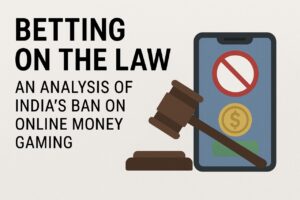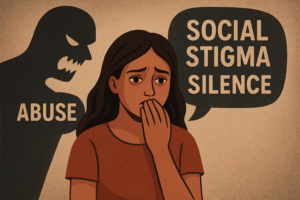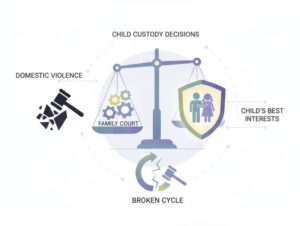
Rukhsar, 29, walked into a police station in Ghaziabad with bruises and a diary documenting years of abuse. She was met with suspicion, not support. “Another 498A?” the officer muttered, implying her suffering was just another false case. In Gurugram, a practicing doctor financially independent, educated, and socially empowered filed repeated complaints of domestic violence. Yet, she too was brushed aside, told to “conduct herself properly.”
Two women. Two different worlds. Yet, both silenced by the same prejudice.
Their Pain Was Real, But They Were Met with Prejudice Instead of Sympathy
The story of Rukhsar(fictional) and the Doctor from Gurugram(real) is not the story of just two women, but lakhs of women who go through the same kind of pain, same kind of abuse and same kind of prejudice. Some have the means to take it up to the court, while thousands of others shackled by the social and familial expectations of “keeping the family together” keep enduring the abuse silently.
This story is not about those who remain silent, their plight is not even quantifiable in the numbers of NCRB data, as they never report it. But it is of those women, who want to break the cycle of abuse, who come forward breaking the shackles of familial expectations, letting the image of a good woman in society be tarnished, yet when they reach the system, they are met with prejudice, instead of empathy.
Not Every Case Is Fake; But the Fake Ones Are Silencing the Real Ones
NCRB data shows that in 2021 alone, over 190,000 cases were filed under cruelty by husband or relatives (IPC 498A, now BNS Section 85). The conviction rate for these cases is low, some due to mistake of fact, others for the lack of evidences. The lower conviction rate coupled with the growing unrest relating to false cases, paints the picture of a “lying woman”. However, is it fair to label a victim based on assumptions that the case she brought up is nothing but a figment of her imagination? We see the cases of women suffering every day, and in a society like ours, where the woman is said to adjust, where domestic violence is justified as “adjustment”, it is very difficult to even speak up.
Take the instance of a recent case of Nikki Bhati, while the fact that the husband did emulate her or if she did it herself is still a matter of investigation, but the fact that her husband and in-laws were abusive and the constant pressure for dowry has been confirmed by the father of the deceased. However, despite the many cries for help to her family, despite once leaving the matrimonial home to stay at her parent’s house, because of the constant abuse, she was sent back to the abusive household. When a reporter asked her father despite knowing that she was being abused, his response was shocking. He said that he did what the “samaj” decided, a decision that would later take away the life of his daughter. Her case not even reported until she succumbed to death, after enduring years of abuse silently.
While there are thousands of Nikkis silenced by the society, enduring the abuse for years, there women, like Rukhsar or the doctor who, they dare report it, and what do they get for their courage, to break free from the shackles? Disbelief, prejudice, and sometimes even threats. Their truth is weighed against the stereotype of “lying women misusing the law.”
Justice Denied: How False Allegations Hurt Genuine Women the Most
False cases do not only harm the accused men they damage the credibility of women. Courts, police, and even families hesitate to believe genuine survivors. The price of this disbelief is paid not by the women who misuse the law, but by women who desperately need its protection.
She Needed Protection, But Found Prejudice
The law provides multiple protections; the Protection of Women from Domestic Violence Act, 2005 offers civil remedies like protection orders, residence rights, and monetary relief. Yet, when women approach the system, they are too often told to “adjust” or “settle” at home.
Even educated and financially independent women, like the Gurugram doctor, are denied the dignity of being believed. Sometimes, not even an FIR is registered, as reported by the “Gurugram Doctor”, that her FIR was not registered despite two domestic violence plaints filed, as reported in Times of India. If this is the treatment for an empowered woman, the plight of women like Rukhsar; financially dependent, socially vulnerable is beyond imagination.
The Hidden Cost of Misuse: Real Victims Left Behind
Because of a small percentage of false cases:
- Police hesitate to register FIRs.
- Courts delay hearings.
- Interim reliefs are harder to secure.
This forces many genuine victims to abandon their pursuit of justice. The hidden cost is not just legal, it’s emotional, psychological, and sometimes fatal.
Cry for Help Ignored: When the System Stops Listening to Real Victims
The Supreme Court, in cases like Rajesh Sharma v. State of U.P. (2017), acknowledged misuse of dowry harassment laws and recommended pre-screening committees. While meant to protect the innocent, these mechanisms often delay urgent relief to genuine victims.
Meanwhile, women in violent homes are told to “wait” while their suffering is “verified.”
She Fought for Justice, but Paid for Others’ Lies
Rukhsar, poor and dependent, and the doctor, educated and independent, share the same story: both were doubted, dismissed, and left vulnerable. Their only commonality was being women in a society conditioned to question their pain.
The lie of some woman has become the burden of many.
Between Truth and a Lie: Why Some Women Can’t Get Justice Anymore
Misuse of law is real; but the plight of women enduring abuse is real too. The tragedy is that ,lies, has created a culture of disbelief, where every woman’s complaint is suspect.
What women need is not disbelief, but discernment. A system that investigates fairly, protects swiftly, and ensures that justice does not come at the cost of endless prejudice.
What Can Women Do to Get Justice?
Even if prejudice makes it harder, the law does protect women. Here are some things to keep in mind if you are a woman entangled in such situation.
Collect Evidence – keep medical records, abusive messages, and witness statements. These become crucial if someone tries to dismiss your complaint as “false.”
- File a Complaint – you can register an FIR for:
- Cruelty by husband/in-laws – Section 85, BNS
- Dowry harassment – Section 64, BNS
- Dowry death (in extreme cases) – Section 69, BNS
- Domestic violence – Protection of Women from Domestic Violence Act, 2005 (PWDVA)
If the police refuse, you may approach the Superintendent of Police or file directly before a Magistrate under BNSS, Section 173.
- Seek Civil Protection under PWDVA – Courts can give:
- Protection Orders (stop abuse/harassment)
- Residence Orders (right to live in your home)
- Monetary Relief (financial support)
- Custody Orders (for your children’s safety)
- Maintenance Rights – You can claim financial support:
- Section 125, BNSS (earlier CrPC)
- Hindu Adoption & Maintenance Act, 1956
- Free Legal Aid – Under the Legal Services Authorities Act, 1987, every woman is entitled to a free lawyer if she cannot afford one.
- Reach Out for Immediate Help – Women’s helpline 181, Women’s Cells in each district, and the State Commission for Women can intervene quickly.
Remember: False cases are rare. Your truth matters, and the law is your shield, use it without fear.
by Reecha Sharma
https://www.linkedin.com/in/reecha-sharma-undefined-057b17337



